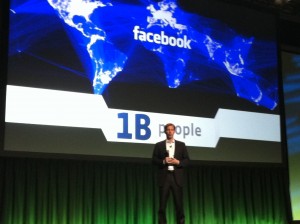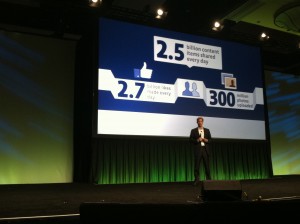By and large, marketers are an optimistic lot. We're often big extroverts with big ideas, laying grand plans and generally having a good time along the way. Our view of the future is usually rosy, with all sorts of reasons to hope for the best and reach for the stars. So it came as no surprise to me that David Fischer, Facebook's VP of Business & Marketing Partnerships is optimistic. Wouldn't you be optimistic if you had a billion friends?
 Some people cite the existence of pets and other "non-people" with Facebook pages as reason to believe the 1 Billion followers claim is overstated, but even allowing for 50% of potential "non-people" on Facebook, it would total 500 Million users. That's a big deal by any measure - HUGE, in fact.
Some people cite the existence of pets and other "non-people" with Facebook pages as reason to believe the 1 Billion followers claim is overstated, but even allowing for 50% of potential "non-people" on Facebook, it would total 500 Million users. That's a big deal by any measure - HUGE, in fact.
Imagine all 500 million of them spread around the globe, buzzing like bugs at a huge picnic - except in this case they're all "liking," "sharing," cheering on the bold ones and complaining about the potato salad together. You just can't ignore 'em. So what Facebook has to say matters, especially since they have rich, intimate details about all their users.
 That said, the future vision that David laid out at this year's DMA annual conference boiled down to marketers being able to do better targeting and better discovery. Normally, getting a "future view" from a vendor explained to me in terms of products under development would be annoying, but after all this is Facebook - one of the Tech Titans I mentioned in my last post.
That said, the future vision that David laid out at this year's DMA annual conference boiled down to marketers being able to do better targeting and better discovery. Normally, getting a "future view" from a vendor explained to me in terms of products under development would be annoying, but after all this is Facebook - one of the Tech Titans I mentioned in my last post.
This is worth paying attention to, so here are some of the details that David shared:
.
Better targeting
- Facebook Exchange, or "FBX" is a product that will enable you to take information about people’s online behavior (off Facebook) and use that to target your messages effectively to them on Facebook. The implications are both exciting and scary, but so were online transactions "back in the day." How many of you hesitate to buy a product or service online with a credit or debit card today? If anyone can pull it off, it will be Facebook. David cited results of some of their pilot customers - a company called Shoebuy.com showing a 7x ROI versus other forms of advertising, and a travel company with 4 times higher ad spend on their pilot.
- Custom Audiences is another product in the works that enables you to combine your own customer information with Facebook data and run better, more targeted advertising. He explained that you would take your database and match email addresses or other contact points to connect your data with the Facebook data. Their early pilots show ROI ranging from 3x to 15x higher than other forms of online advertising.
- Facebook Offers will enable marketers to achieve better conversion by allowing them to acquire and leverage word of mouth marketing. By one example, Rosetta Stone achieved results that were similar to their paid search results, with their pilot generating 560,000 claims and about 3.3x ROI. More significantly, it appears that the bigger opportunities are for lesser-known brands.David cited a second pilot with Coastal.com, an online vendor of eyeglasses. In their case, they achieved 400,000 claims, achieving a three-fold increase in first-pair-free on-site conversion, with 60% of the impressions served in News Feed. What was most noteworthy is that 75% of the claims were not from the people directly targeted, but from the people shared with. In other words, 75% of the conversions were from an audience not thought to be the initial target market. The implications of that's huge!
Better Discovery
- Facebook Collections is a new product that's similar to catalogs. It enables a merchant to put up a collection of products, enabling users to declare interest by clicking a “want” button, which would be a form of "opt-in." It then gives the vendor the ability to get complete profile data and ideally start personalizing offers - what marketer doesn't want to do that? Early participants in the Facebook Collections pilot included Pottery Barn, Nieman-Marcus, Michael Kors and Victoria's Secret. (how about that for a collection of beta testers?)
All four of these products by Facebook are data-driven and based on the kind of analytics that SAS has honed over the last 35 years. So I could not have been more excited for the possibilities. For individuals with privacy concerns, these developments can be profoundly disturbing. For large swaths of the audience at the DMA annual conference like list vendors and others who are looking at Facebook as a competitor - the message could not have been more ominous. And remember - Facebook is just one of the five Tech Titans.
What do you think about this view of the future? Do you "like" it? Please share your thoughts with a comment.
